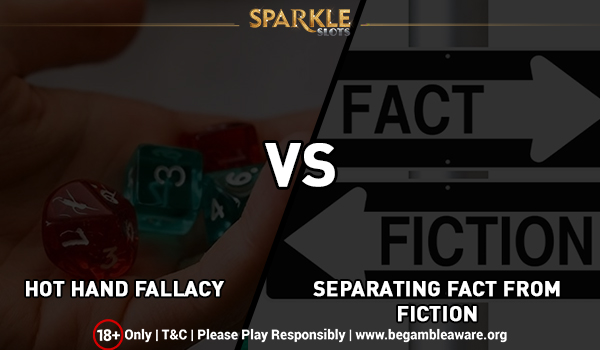Hot Hand Fallacy – Superstition or Fact
The hot hand fallacy exists as a common misconception in the gambling and sports industry. It refers to a non-existing connection between the persistence with which certain events occur and the future events which are yet to occur. If an individual has won in the past (and is hot), then whatever they choose to bet on is likely to win in the future. The hot hand is thought to be caused by the illusion of control. Individuals believe that they (or others) exert control over events that are randomly determined. In games such as craps, for example, the dice cannot be controlled by the shooter to land the desired number. But still, you will often hear around the craps table opinions of the kind that “he is on a hot streak” as if a player can interpret the random patterns by which throwing dice can lead to landing a specific number.

The Hot Hand Fallacy Psychology
What is the psychology behind believing in hot-hand fallacy? Well, first of all, players want them to be actual while remaining happily ignorant of the hard truth. Apart from that, the psychology directing this sort of behaviour is something that the casino industry is exploiting very cleverly.
Hot Hand Fallacy and Gambler’s Fallacy
What’s the gambler’s fallacy? By and large, people are lured into thinking that a small sample of the behaviour of a variable should mimic perfectly the big-scale pattern. Such delusional way of thinking is induced, more often than not, in cases such as the toss of a coin, where it is equally probable for one of 2 results to happen. At first sight, the gambler’s fallacy and the hot hand fallacy are two completely different ideas expressing contradicting observations. Research does not show any correlation between the two either. Seemingly, both concepts are just an informal way for people to refer to the otherwise random sequences of events that we can observe in real life.
RTP
Now let us discuss another common misconception regarding RTP (theoretical return-to-player). RTP is the number detailed in the specifications of every digital version of any game of chance. It is possible that if you saw a 98% theoretical return gaming software and got carried away thinking that it is near impossible to lose anything playing that? This is where you would be very wrong. A positive for the player outcome may never occur even if there is only a 1% chance for this to happen every round. It just says how much, in theory, the game is meant to give back to the player for all the time while it is playing. The time is not specified, and that is why it is called “theoretical” return to the player. It is just a good indicator to give you an idea of how profitable a game of chance can be in the long term.
Mathematical Data and Hot Hand Fallacy
The mathematical studies of hot hand fallacy and gambler’s fallacy suggest that both ideas are fundamentally wrong. There is no empirical data to support any claims that having a ‘hot hand’ or successful streak can magically make everything work the right way in gambling. So it is better to stick to your skills and adopt a good betting strategy rather than relying on superstition and fallacies. You can choose a good gambling website too to help you in this regard.
You Are on a Running Streak, So What Should You Do Next?
A good positive streak is never going to improve your chances of gaining, but, on the other hand, it means you are playing the house’s money, which is always a motivation to keep going. The only thing you should remember is to keep calm and stick to your game plan regardless of winning or losing. You should never allow the fallacies to influence your decision making. You have to make a rational decision based on your long-term goals, your budget and your current frame of mind. Because if you bet too much in a tryst to get your money back or get too hyped up by a positive streak, you are very likely to make mistakes. You should focus on the things you can control which are making bets and strategies and hope that lady luck will be on your side!

